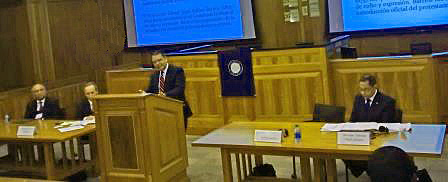





Reported by Tara Fitzgerald
The Latin America Breakout Session held on Monday, October 6, 2014 in JRLB 205 was moderated by Professor Guillermo Garcia-Montufar of the University of Lima and consisted of a panel of government leaders from Peru, the Dominican Republic, and Guatemala.
Peru Congressman Julio Rosas Huaranga opened his remarks by expressing concern that religious freedom is being taken away in his country and that secularism is making its way into politics. He explained that although the constitution guarantees freedom of religion, opinion, and conscience, he is no longer able to speak from his own perspective because of a resolution that identifies religion as more of a private view than a public matter. He expressed his belief that religion is important because of its principles and values that influence society, and that it needs to be present not only in society, but in the government and many other spheres of life.
Mariano German Mejia Jimenez, President of the Dominican Republic Supreme Court of Justice, acknowledged that religion has been present in society from the beginning of man, beliefs are substantial, and that Church and State have never been strangers to each another. The Dominican Republic Constitution declares Catholicism as the official religion, but freedom of religion, including practice and association, is guaranteed. As an example, Law 198 No. 11 regulates marriages and gives to celebrated marriages in all religions the same benefits given through the Catholic Church. He concluded that religion and government can coexist, and that all religions can be supported notwithstanding their differences.
Guatemala Congressman Selvin Garcia laid out some historical and legal framework as a basis for his remarks. He introduced legislation on freedom of religion (Article 36) and explained that the Catholic Church is already constituted, but that other religions have free exercise and can receive public recognition as well. He then discussed a case featuring a clash toward freedom of religion concerning an orthodox Jewish community that migrated to Guatemala from Canada because of persecution and was threatened to leave by the local municipality if they did not adapt to the municipality’s street code. He explained that this case has produced a lot of critics but has not been followed through. Congressman Garcia concluded his remarks by describing how religion in Guatemala has changed significantly by its increasing number of Christians and decreasing number of Catholics.
